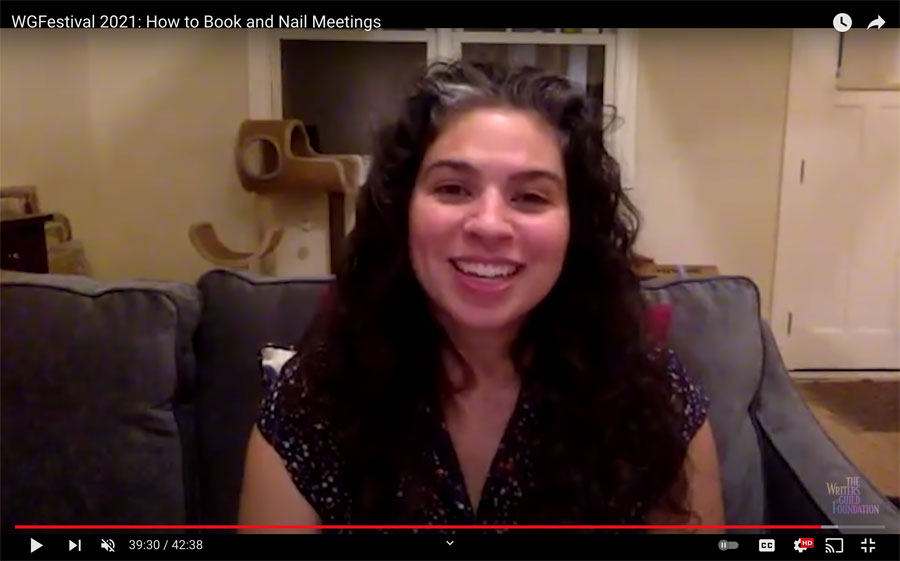
How to Book and Nail Meetings
Tips for meeting prep, etiquette, and how to follow up.
(1/21/2022)
If you are new to the industry and just beginning to meet with execs and potential reps, you may be wondering how to get the most out of your meetings. Hosted by the Writers Guild Foundation at the “virtually in-person” WGFestival 2021, The Flash co-producer Christina M. Walker gave attendees some tips and tricks for meeting prep, what to expect, and how to follow up afterward. Here are some key takeaways that are good reminders for even the most seasoned of writers:
Agent and Manager Meetings:
- Remember that you are also interviewing them, even while they are interviewing you as a potential client. Ask them what about your writing sparked their interest in taking you on. If after the meeting you feel like they are not the right fit for you, say no! You will eventually find someone to represent you who will help you pave the way to be the kind of writer you want to be, including in which specific genre.
General Meetings:
- Practice. Practice with friends, or record yourself and watch it back. Get comfortable sharing stories that reflect who you are as a writer. Sometimes the person you’re meeting with will sit back and ask you to tell them about yourself, so be prepared for that. Other times, they may want to steer the conversation, but you want to be ready if they expect you to start things off.
Showrunner Meetings:
- It’s crucial that you have read the pilot you’re being put up for or are familiar with the show. Talk about the stories from your life that lend themselves to the characters or the stories that show might delve into in upcoming seasons.
Pitch Meetings:
- Have thoughts past just the pilot and first season; come in with brushstrokes for the second and third seasons too.
Outreach and Networking:
- Writers hire and recommend other writers. If you don’t know a lot of writers, meet more writers! Look for events that will help you network with other writers.
- Put the word out that you’re looking for advice. Take a coffee meeting, have a script ready for a showrunner to read, ask to pick someone’s brain about what they said at a panel event, ask someone if they would be willing to read your script if/when they have time. Be prepared for the sit-down in case someone is ready to read something you wrote. (If they say yes, DO NOT WAIT. Send it over right away.)
- Write a list of shows you want to land a meeting with. Map out the show’s writers, showrunners, executives, etc. and think of any friends or connections who may know those people. Use this list to strategize how you plan to land a meeting.
Meeting Prep:
- Go in with an agenda. Have at least two questions to ask them, specifically about the project or about the production company/studio/network.
- Do your own research on who you’re sitting down to the meeting with, because you can lead with that (such as if they grew up in the same town as you, etc.). Make an actual connection with them so they remember you. If the person covers certain shows, be prepared to talk about at least one or two. Everyone likes hearing positive feedback about their projects.
- Good rule of thumb: Arrive 5 minutes early for virtual meetings, and 10 minutes ahead for in-person meetings.
- Get yourself in the right headspace before the meeting, whether that’s listening to a certain song, meditating, going for a walk, etc.
Follow-Up:
- Get an email address before you leave the meeting. Don’t rely on your reps to maintain the relationship for you. Then, follow up with a thank-you email, especially if you talked about something you’re super excited about, and reiterate.
- Take advantage of natural opportunities to follow up with them, such as if you talked about a specific upcoming project of theirs that you were excited about, but they’d signed an NDA and said they couldn’t talk about it for two months. There’s your chance to follow up later!
- How long to wait to follow up depends on the person. If they tell you they’re going to be slammed for the next week, month, six months, or year, follow up after that amount of time. Keep a chart or grid for yourself to keep track of where people are and when to reach out to them, which includes doing your own research on what they’re working on, etc.
If you did your job and you shared the information about yourself that you wanted to, then that’s a good meeting. Be diligent about your meeting prep and follow-up, and it’ll pay off with new opportunities. Watch WGFestival 2021: How to Book and Nail Meetings here.

